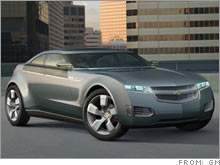GM tries to change image to Green MotorsIn era of high gas prices, U.S. automaker is trying to build a car to leapfrog Toyota's hybrid efforts and change buyers' view of its products, too.DETROIT (CNNMoney.com) -- General Motors' environmental image is an inconvenient perception for the company. The automaker, which was essentially the villain in the documentary film "Who killed the electric car?" in 2006, is seen as a big part of the problem by those concerned about the environment and global warming.
And industry experts agree that perception translates into difficulties for GM (Charts). In an era of high gasoline prices, the automaker that makes Hummers is competing against Toyota (Charts), well known for making fuel-efficient, environmentally friendly hybrids. Even for buyers who would never purchase a vehicle from either car maker, the image of gas-guzzling GM vs. fuel efficient Toyota is pervasive. And most industry executives and experts agree that fuel efficiency has grown significantly as a factor in the thinking of U.S. buyers over the last year, even if hybrids remain a niche part of the market. At this week's North American International Auto Show, GM officials, who just introduced their first hybrid to the market last year, hope they're taking an important step in changing that opinion. They unveiled the Volt concept car, which unlike a traditional hybrid now on the road, would not have a gasoline engine turning its wheels. It would use an electric motor to power the car, and a small gasoline engine on board would only be used to charge the motor if the battery starts to run low. If the driver can plug the car in to charge it every 40 miles or less, it's conceivable the Volt would never even use the gasoline engine. Meeting with reporters at the auto show Sunday, GM Chairman and CEO Rick Wagoner denied that the effort to put the Volt's "plug-in hybrid" technology in showrooms by 2010 is not just a marketing ploy, saying GM is spending too much money and resources on the effort simply to change the company's image and alter public perception. "If we could get that car on the road for $500 million, we'd be high-fiving each other," he said when asked about the development costs. But a change in perception is a big part of the gain that GM hopes to make from these efforts. "Research would suggest that we probably underperform in perception of doing those things," Wagoner said. "In the end, it's a question of whether we're part of the problem or part of the solution. We think we're a big part of the solution. We hope people recognize that, and we're not going to be shy about pointing that out to them." And Wagoner says it's not too late to convince consumers that GM is serious about the environment and fuel economy. "It's nowhere near a lost cause," he said. "We're in the first five minutes of a 40-minute basketball game." GM not only has to play catch-up with Toyota and Honda Motor (Charts) on hybrids, it trails U.S. competitor Ford Motor (Charts), which has been selling about 20,000 hybrid Escape SUVs a year. But Ford has scaled back its own hybrid plans in the face of financial troubles. DaimlerChrysler (Charts) and Nissan (Charts) have yet to unveil a hybrid vehicle. Bill Reinert, national manager of the advance technology group at Toyota said he's seen what he calls a tectonic shift in attitudes in the industry about the consumer's demand for alternative fuel vehicles. "I've been coming to these shows for several years. Last year you could hardly spell environment," he said. "This year it's all about the environment." But he said Toyota's not worried about the competitive threat from GM and other Detroit automakers discovering the appeal of developing environmentally-friendly cars. "Honda and Toyota have established a lead and let's be realistic, it's a big lead," he said. "The rest of the manufacturers have to catch up." Some environmental activists are embracing the GM efforts. Chris Paine, who directed "Who Killed the Electric Car?" was at the show Sunday filming the unveiling of the Volt. He's hopeful that GM is serious about this electric car effort. "I'll be satisfied when I see these cars on the road and you can buy them," said Paine. "But I think they're sincere. I think they're responding to the consumer. I think people are increasingly aware about global warming and want a car that is better for the planet." Wagoner and even officials at Toyota say they aren't seeing many people basing their car-buying decisions upon environmental concerns as much as the cost equation. The data does not show "a mad rush to buy environmentally-friendly vehicles," Wagoner said. "But people do tell us they would like to have less [gas] consumption, less emissions." One of the factors that could be raising the importance of a car's environmental friendliness is growing concern that regulations are coming that would further hit the sales of gas guzzlers more than the $3 a gallon gas already has. "Are consumers changing auto buying habits due to global warming and Al Gore's 'An Inconvenient Truth?' That's hard to tease out," said Roland Hwang, vehicle policy director with the National Resource Defense Council. "But it's clear that global warming and 'An Inconvenient Truth,' have changed politicians' priorities. I think over the last year it's become inevitable that global warming limits will be put into place in this country." |
|

